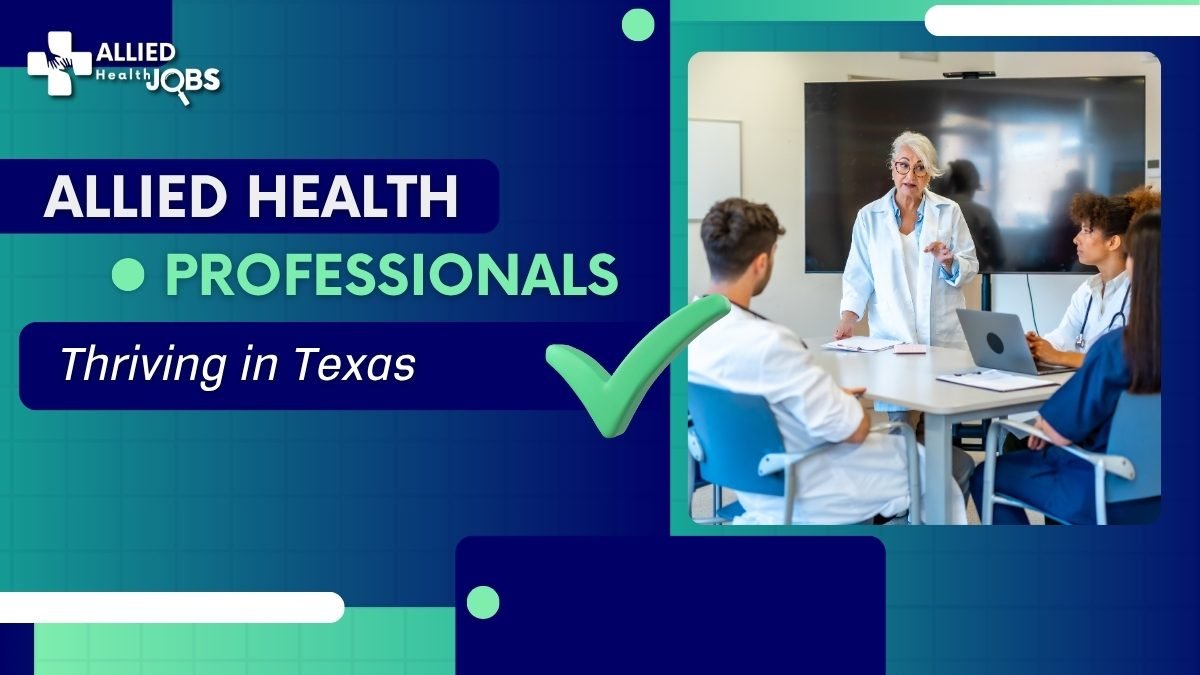Introduction
Allied healthcare practitioners are integral to healthcare, providing essential services in patient care, diagnostics, and rehabilitation. For those who wish to start allied health careers, many allied health occupations have training programs that last just weeks or months, all paving the way for rewarding allied health job openings. This blog covers the fastest allied health jobs and careers, focusing on those with minimal training for maximum impact.
Why Choose Allied Healthcare Career Paths With Short medical training?

With an aging population and ever-expanding needs for healthcare, the demand for allied health jobs is increasing. Unlike medical degrees requiring years of studies, many allied healthcare positions feature fast-track medical training, making them suitable for career changers or those who want to cut straight to the job. These positions have security, great pay, and the ability to affect a person’s life positively. So, whether you are seeking the best allied healthcare jobs or first-time allied jobs, short medical training programs make a perfect amalgamation with allied healthcare career paths.
Benefits of Short Medical Training in Allied Health Employment Opportunities
- Quick Employment: Some allied health jobs require in-between 4 and 12 weeks of medical training; hence, one can join the workforce in a short time.
- Cost-Effective: Shorter medical training programs usually charge lower tuition fees than traditional degree courses, thus reducing the financial barrier.
- Flexible Hours: Most allied healthcare jobs can be structured as part-time jobs or jobs with flexible hours, great for an individual trying to balance work and life.
- Growth Potential: Trends in allied healthcare professionals hiring highlight the opportunities to grow by getting more certifications.
The Shortest Medical Training Programs for Allied Healthcare Jobs

Based on Allied Health Jobs and other industry trends, here is a profile of the fastest medical training options for allied health careers. These allied healthcare jobs are suitable for those looking for allied health jobs with the least possible time commitment.
Certified Nursing Assistant (CNA)
Training Duration: 4-12 weeks
CNAs are among the principal considerations in allied health employment opportunities, assisting patients with activities of daily living such as bathing, eating, and mobility. CNA programs are typically offered at community colleges or vocational schools, combining some classroom instruction with clinical practices. In one of the posts on X, it was noted that CNA training can be completed in as little as four weeks, thus one of the fastest trainings into allied healthcare jobs.
- Job Outlook: There exists a steady demand for CNAs, mostly in nursing homes and hospitals, according to the BLS.
- Salary: Approximately $38,200 is the median annual wage (BLS, 2023).
- Why Choose It?: CNAs get to work with patients directly and gain a stepping stone into other allied healthcare career options, notably nursing.
Phlebotomy Technician
Training Duration: 4–8 weeks
Working in the allied healthcare profession, phlebotomy technicians collect blood for laboratory test purposes, transfusions, or donations. The training revolves around basic anatomy, blood collection techniques, and safety regulations. The programs rarely have prerequisites and are open to those who are presently interested in allied jobs.
- Job Outlook: BLS foresees an increase of 10% in phlebotomist jobs by the year 2033, owing to the greater demand for diagnostic tests.
- Salary: Median annual salary of approximately $41,810 (BLS, 2023).
- Why Choose It?: Phlebotomy is fast to get certified in and has many work environments to choose from, which is good for the allied healthcare field.
Pharmacy Technician
Training Duration: 3–12 months
Pharmacy technicians saved pharmacists from dispensing medications, which is a major function among granted allied health jobs. Most advanced training programs offer online or classroom training in drug classifications, pharmacy law, and customer service.
- Job Outlook: Per the BLS, there is expected to be a 6% growth in Pharmacy Technician job opportunities by 2033, with work possibilities in retail and hospital settings.
- Salary: The top 10% of earners receive a median annual wage of roughly $43,900 (BLS, 2023).
- Why Choose It?: The pharmacy technician occupation presents a fairly wide variety of workplaces where one may apply for certification, thus promoting the allied healthcare career track.
Medical Assistant
Training Duration: 9 to 12 months
Medical assistants provide a range of clinical and administrative services, bridging patient care and office management within allied healthcare professions. Training includes taking vital signs, scheduling, and medical coding, thus producing a versatile skill set for allied health job opportunities.
- Job Outlook: Forecast by the BLS points to a 14% growth rate for medical assistants from now to 2033, among the more rapidly growing allied professions.
- Salary: Median annual wage of approximately $46,310 (BLS, 2023).
- Why Choose It?: Medical assistants find employment in a wide range of settings, ranging from clinics to private practices, with healthy hiring prospects for allied healthcare professionals.
Emergency Medical Technician (EMT)
Training Duration: 6 to 12 weeks
Emergency Medical Technicians offer emergency medical care, hence an integral part of allied health professions. Training involves CPR, trauma care, and ambulance driving that usually lasts less than a few months. An EMT dresses up for allied healthcare jobs that require adrenaline in the bloodstream.
- Job Outlook: A 6% rate of growth for EMTs is forecast by BLS up to 2033, as demand is determined by ambulance services and hospitals.
- Salary: Median wage was $44,120 per annum, approximately (BLS, 2023).
- Why Choose It?: EMTs prefer a dynamic working environment and may proceed to higher roles, such as paramedic, in allied healthcare career paths.
How to Begin Your Allied Healthcare Journey
Starting your allied health roles aligns well when steps are followed appropriately. Here is how to get into allied health:
- Training: Look for programs for allied jobs in an accredited community college, vocational school, or online that meet the standards required for certification.
- Acquisition of Certification: Most allied health job requirements include some form of certification, e.g., passing the National Health Career Association (NHA) examination for phlebotomy or medical assisting.
- Start Applying: Use sites like Allied Health Jobs to search for allied health job postings. Create an effective resume highlighting your training and skills.
- Development Plan: Short-term programs guide higher-level allied healthcare career opportunities, for example, moving from CNA to registered nurse.
Conclusion
Because of short medical training programs in allied health fields, jobs are available for those who want rapid entrance into allied health types of work. Certain positions, like CNA, phlebotomy technician, pharmacy technician, medical assistant, and EMTs, provide an easy way to enter the field of allied healthcare jobs, with training as short as four weeks. These allied health staffing jobs mix affordability with flexibility and attach meaning to fulfilling service: suitable for any budding allied healthcare professional. Through outlets like Allied Health Jobs, you can find the finest allied health jobs to start your career. Allied jobs are in demand today, and this is the perfect occasion to grab opportunities and make some changes in healthcare.
Follow us on Social Media: LinkedIn | Facebook | Twitter | Instagram












